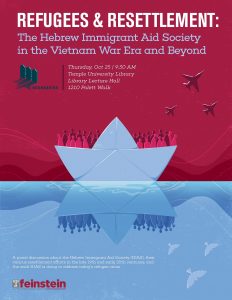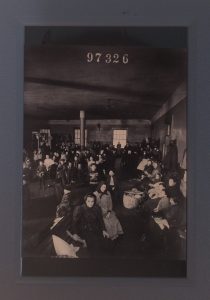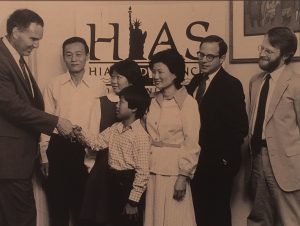 On October 25, 2018, SCRC Associate Archivist Jessica Lydon, joined historian of Vietnam and migration, Professor Dieu T. Nguyen, and Executive Director of HIAS Pennsylvania, Cathryn Miller-Wilson, in Paley Library for a panel discussion. Professor Lila Corwin Berman, Director of the Feinstein Center for American Jewish History, moderated the panel which featured HIAS (Hebrew Immigrant Aid Society) Pennsylvania’s history, its various resettlement efforts, and the work HIAS PA is doing to address today’s refugee crisis.
On October 25, 2018, SCRC Associate Archivist Jessica Lydon, joined historian of Vietnam and migration, Professor Dieu T. Nguyen, and Executive Director of HIAS Pennsylvania, Cathryn Miller-Wilson, in Paley Library for a panel discussion. Professor Lila Corwin Berman, Director of the Feinstein Center for American Jewish History, moderated the panel which featured HIAS (Hebrew Immigrant Aid Society) Pennsylvania’s history, its various resettlement efforts, and the work HIAS PA is doing to address today’s refugee crisis.

Lydon highlighted portions of the HIAS Pennsylvania Records collection held in Temple University Libraries Special Collections Research Center, most notably the organization’s resettling of Jewish refugees fleeing persecution in the Russian empire during the late 19th and early 20th centuries; advocacy work against restrictive immigration legislation including literacy tests and head taxes; and collaborative resettlement work with local VOLAGs (voluntary agencies) to assist Southeast Asian refugees in the aftermath of the Vietnam War.
Nguyen shared with attendees a chronology of key events surrounding Vietnam War-related refugees, how Vietnamese refugees regarded American aid associations that assisted them in the resettlement process, current characteristics and figures of Southeast Asian populations in Philadelphia and beyond, as well as her personal connections to these events, through the experiences of her two brothers.

Miller-Wilson spoke about HIAS PA’s current efforts to assist vulnerable populations and some of the challenges to this work including the Department of Homeland Security’s proposed wealth test regulation known as the “public charge rule,” which if enacted would deny green card and other visa applicants for using “one or more public benefit” in the past or being “likely at any time” to receive such benefits in the future.
–Jessica M. Lydon, Associate Archivist, SCRC